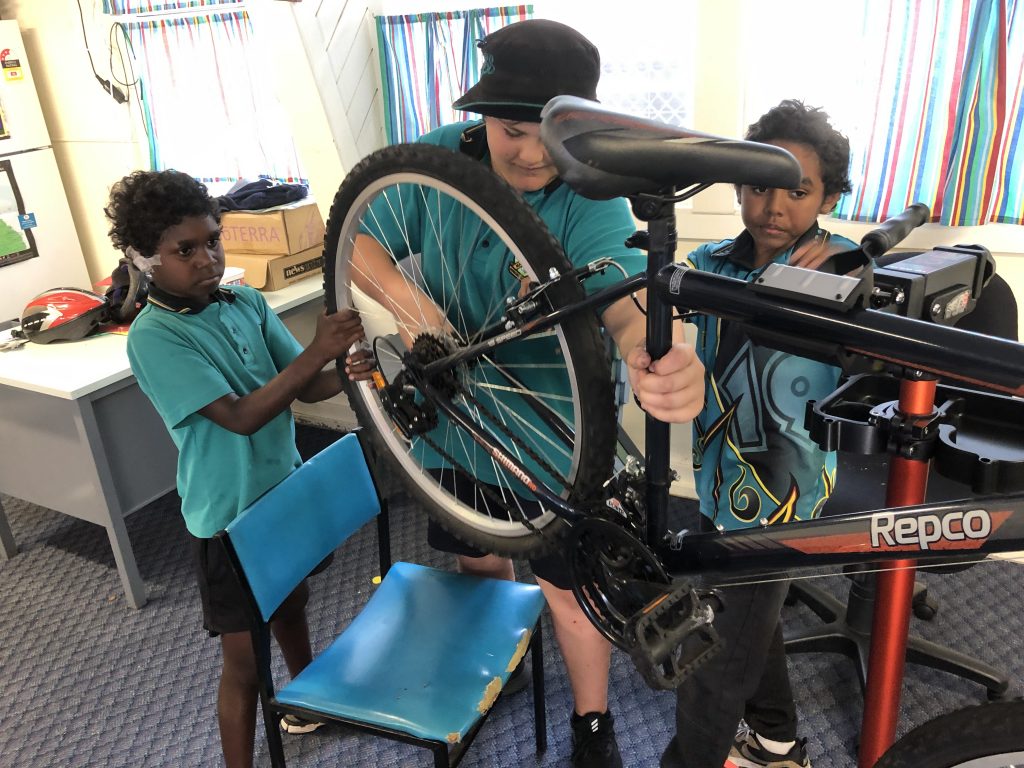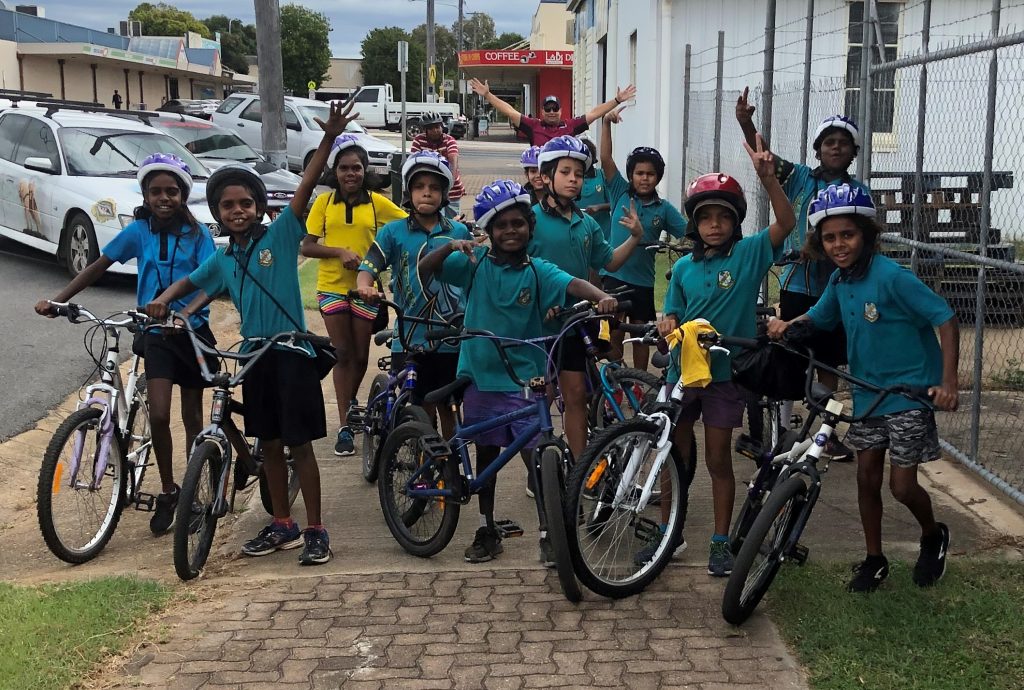Foundation for Rural & Regional Renewal (FRRR)
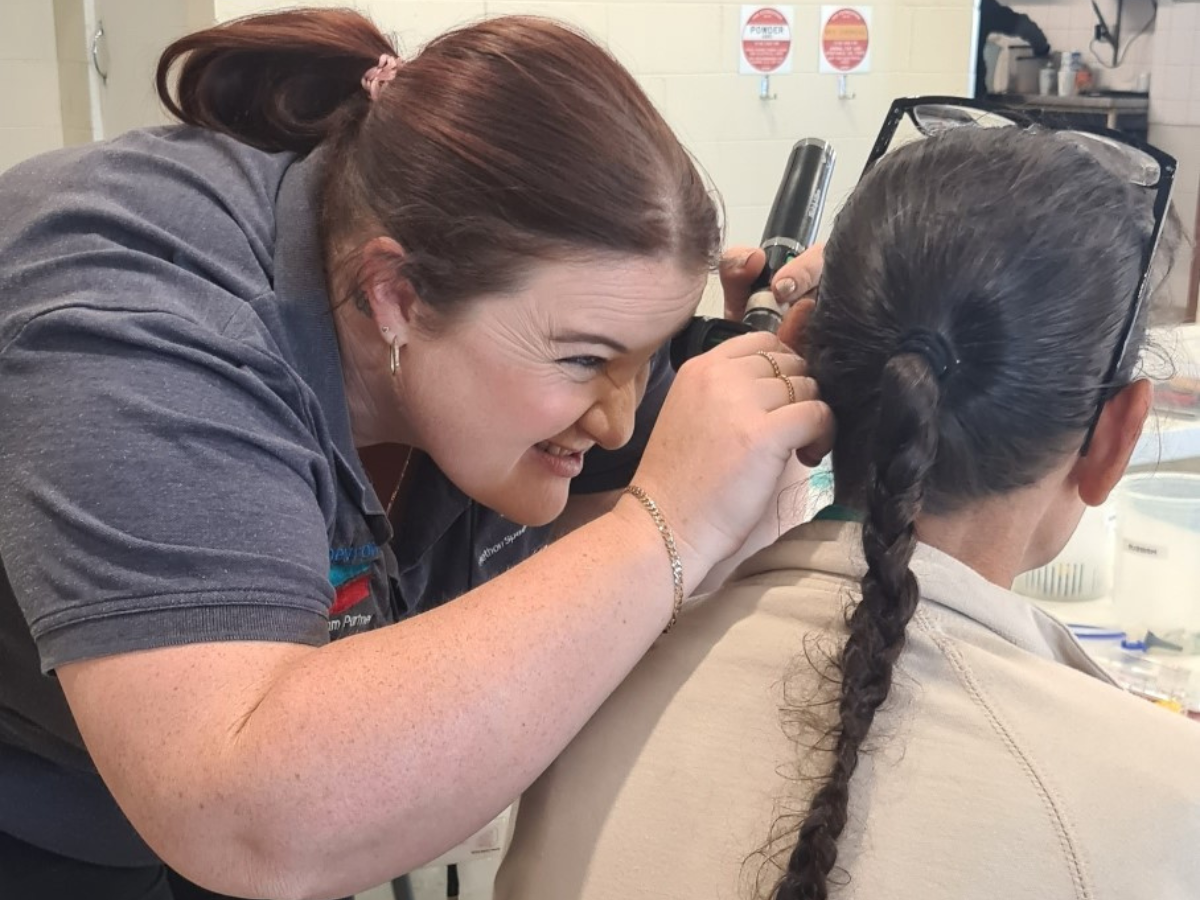
Thanks to a $8,904 SRC grant supported by the Sidney Myer Fund, Telethon Speech & Hearing Inc was able purchase cutting edge screening technology to streamline its early detection and surveillance of hearing loss at early childhood centres and primary schools across the Pilbara, Kimberley and Wheatbelt regions of WA. Many children in these regions are at risk of developing chronic ear health conditions, which impact all facets of their life including social, behavioural and academic performance, if not addressed early.
The HearX apps and four digital devices have enabled screening and clinical hearing tests to be undertaken in a faster, more reliable way. The software supersedes traditional devices, so that ear screenings can be conducted with a tablet. This was particularly important for Telethon when its regular ear health clinics had to be cancelled due to COVID and a major flood in Onslow. Fortunately, Telethon’s locally based team was able to upskill early years educators, teachers and nurses to undertake the screenings and Telethon’s audiologists could then analyse data and generate reports remotely.
“We have since integrated a tele-health component into our audiology service offerings, allowing our locally based teams to screen children and liaise with our Perth audiology team in real time. This has allowed us to diversify our service delivery modalities, ensuring more frequent hearing supports than would otherwise be on offer pre-COVID.”
The partnership between the Foundation for Rural & Regional Renewal (FRRR) and the Helen Macpherson Smith Trust (HMST) highlights the value of grassroots-focused capacity building in community development.
We are pleased to bring you a Q&A featuring Debra Morgan, an accomplished leader with two decades of executive experience in the philanthropic and for-purpose sectors. Debra joined HMST in October 2021 and has been instrumental in shaping and delivering philanthropic programs that make a meaningful difference.
HMST made a substantial donation to FRRR’s Bushfire Recovery Fund, developed innovatively with further collaboration with the Sidney Myer Fund (SMF). This Fund was developed to meet a gap in the funds being made available to Victorian communities affected by the 2019/20 bushfires, which was building the capacity of organisations in those communities to address challenges in their operations, supporting their growth and development to enable their continued support of their communities’ recovery.
Breaking away from traditional grant structures, the program employed community consultation to identify backbone organisations for multi-year funding. Over three years, the Program Advisory Committee, featuring Debra Morgan, guided the program, and in November 2023 the grant program awarded the final multi-year grants to 9 organisations across North East Victoria and East Gippsland. The recipients represent a broad range of organisations from Indigenous-led initiatives to neighborhood centres. As these projects unfold over the next 24 months, FRRR and HMST’s collaboration serves as a powerful example in the philanthropic community.
Watch the video or read the Q&A text to hear Debra Morgan shed light on the intricacies of this impactful partnership.
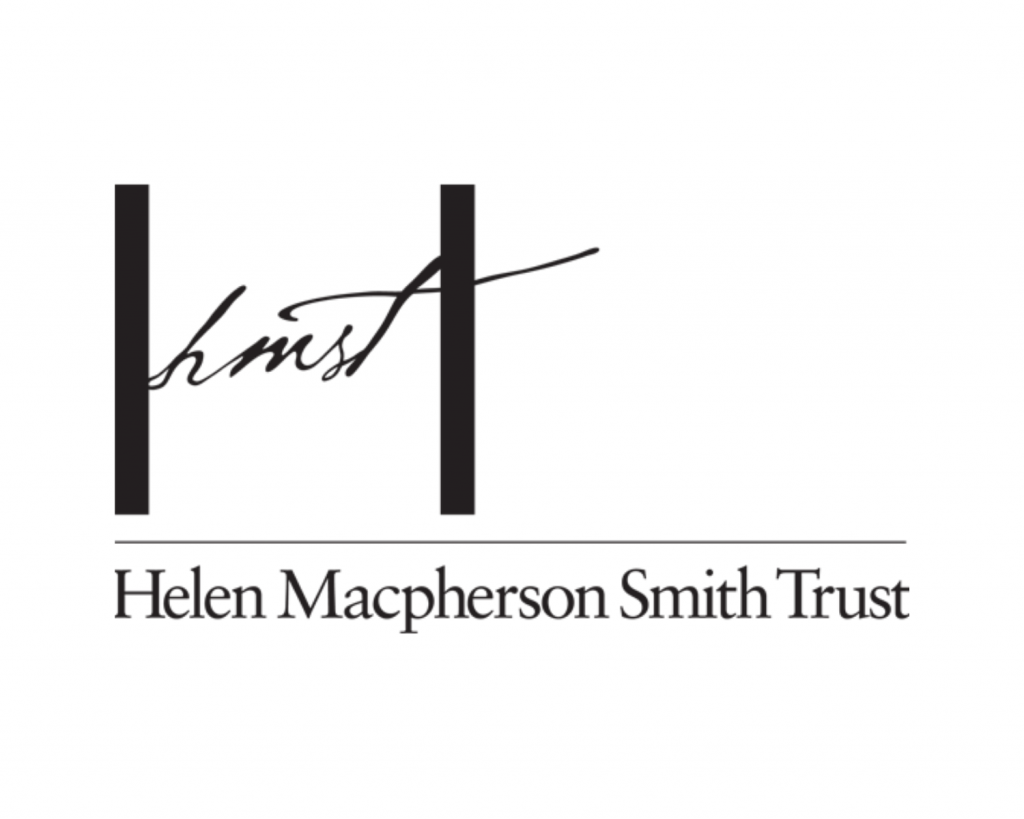
Tell us about Helen Macpherson Smith Trust and your giving strategy?
We have a strategy which is focused on community resilience and place-based education. We’ve moved from a really broad giving strategy; we were funding in a lot of different areas, and we felt that we really wanted to be able to understand our impact. So we’ve moved to two areas of impact: community and education. And we’re supporting FRRR through our community resilience lens.
What’s unique about the Bushfire Recovery Fund and what did Helen Macpherson Smith Trust set out to achieve with it?
When the bushfires hit in Victoria, trustees really wanted to help the communities and to make a difference. But we understood that an immediate grant may not be the best response, and that communities, while they were dealing with the immediate trauma of the fires might not be best placed to understand their future path. And so through FRRR and with the Sidney Myer Fund, we held hands, and we navigated to the Bushfire Recovery Fund, which is about enabling FRRR to work deeply with bushfire affected communities to understand their needs, and their readiness to receive funds to create a better future for those communities.
What does the Helen Macpherson Smith Trust and co-funder the Sidney Myer Fund see as the strengths of the partnership?
Some of the highlights of the Bushfire Recovery Fund and working so closely with FRRR and the Sidney Myer Fund on this project has been understanding community voices through FRRR and from the community directly.
FRRR plays an amazing role – really working deeply with communities to understand needs, and I credit them with the work that they do on the ground with communities to help them navigate – often complex – granting regimes that we impose as funders, and to understand how we can practically make a difference.
We’ve had the opportunity at Helen Macpherson Smith Trust to meet some of those fantastic community members along the way. We’ve traveled to Mallacoota and met the community health team there we traveled to Sarsfield out of Bairnsdale to see and meet with the community organisation there. And those people are changing their communities – they’re the coalface and they’re making lives better for their community members, and it’s so inspiring to see them. We couldn’t do that without the support of FRRR and without FRRR working on the ground. So we’re really grateful. That’s been absolutely a program highlight for me.
Can you tell me more about how about your partnership and working with the FRRR team?
We’re a really tiny team at Helen Macpherson Smith Trust and we’re based in Melbourne. So one of the great things about FRRR is that there’s people on the ground in rural and regional communities – not just around Victoria but around Australia, and we really see the benefit of that. We feel we can get scale across Victoria through partners like FRRR because of the really deep work that’s happening on the ground. I think that’s one of the rich and wonderful things about FRRR.
Are there any other philanthropic activities and partnerships that you can tell us about?
Through our education focus area we’re funding some really fantastic place-based organisations. We’re funding the Mornington Peninsula Foundation for the education work they’re doing. We’re funding Tomorrow Today Foundation, which is a community foundation in Benalla, again, we’re seeing education outcomes through that project. And we’re also supporting Ganbina in Shepparton – a place-based education project working with Indigenous partners in Shepparton and the region.
Do you have any advice for any philanthropic organisations or other individuals, when choosing who to partner with?
I think the most important thing, when looking at partners to support is the relationships. And we’ve really got a strong relationship with FRRR. We have a long standing relationship with FRRR, and we’re really seeing the benefits of that, and holding hands on the journey, and learning as we go. I see FRRR absolutely as a partner in this – not as a grantor -grantee relationship. We are partners, and I think we’ve really achieved a lot through this project.
Jaithmathang TABOO is an Indigenous organisation working on Country in North East Victoria to support regeneration in the landscape’s recovery following the 2019/20 bushfires, and to support cultural healing.
They were awarded a $120,000 grant in April 2022 (to be paid over three years) from FRRR through the Bushfire Recovery Fund, which is supported by the Helen Macpherson Smith Trust and the Sidney Myer Fund. The funding was for a program of annual cool burns and to work with key environment and government stakeholders to share learnings.
The project, titled ‘Beginning the journey to cultural healing on Jaithmathang Country’, specifically aimed to build the capacity of the organisation by contributing to the cost of employing a Jaithmathang descendant for three years to project manage the cool burning program in the Falls Creek region. It also aimed to help in establishing ongoing partnerships and engagement with key stakeholder organisations that can support Jaithmathang to operate sustainably into the future as custodians on Country.
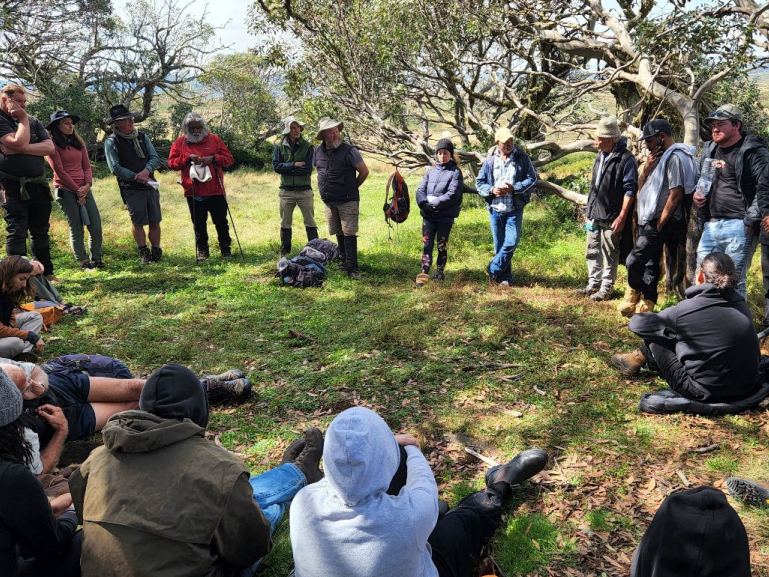
The organisation recently submitted an interim report about what they did in the first year of funding. FRRR’s Program Manager, Danielle Griffin, says the group should be really proud of what they’ve achieved in the first year.
“In year one, Jaithmathang has successfully engaged with the targeted government, First Nations and subject matter expert stakeholders to support their foundational return to Jaithmathang Country. As the Jaithmathang Elders belong to the stolen generation and were removed from Country, it is a privilege to be involved in this significant work to build their capacity for returning to Country and participate in local recovery through disaster management and the intrinsic healing practices that will support Indigenous land and people. The tripartite partnership is a great outcome for year one of this grant,” she said.
The following is an extract from the report, which provides more detail on the background and the partnerships created to date.
The countryside of Bimble is our age-old family tree and it reflects in its rich and diverse lands, the history and heritage of the Jaithmathang Original Peoples. It is our most ancient landscape and it is beautiful and life giving. Mung, Tyer and Buller and all creatures and living things created by Bunjilla are respected and form part of the interconnected ecosystem where each is essential to one another. Our women, men and children are connected through birth right to our Bunjilla Dreaming Bimble, where we reconnect with our spiritual origins and renew our sense of belonging and meaning.
Cultural burning, or the use of fire as a tool for managing landscapes, was an intrinsic part of the connection to country for many Indigenous cultures. Cultural burning is a deeply cultural and spiritual practice that played an important role in the relationship between Indigenous people and our land. It was a tool for managing the land, communicating with the spirits, and maintaining a strong connection to country.
Despite the worsening severity of bushfire activity in Australia, the recognition and adoption of meaningful cultural cool burning as part of a defensive strategy is still in its infancy in current land management practices. We have developed strong partnerships with private landholders and government to achieve the access, consent and participation from all stakeholders required to build an effective approach to fire management, underpinned by traditional knowledge and practices. However, resistance to the introduction of more traditional fire management practice is problematic and will require ongoing work, coordination and support.
Jaithmathang TABOO, Nallawilli Bunjil and CSIRO have creating a tripartite working group to reintroduce traditional cultural burning practices and Indigenous fire knowledge into modern fire management. Nallawilli Bunjil is a commercial drone surveillance and data modelling organisation led by Jaithmathang Elder Roderick McCleod, which provides expertise in virtual modelling to capture real time data about a landscape, including temperature, weather conditions, and for the purposes of fire management, fuel hazard. All parties aim to enhance the health of the land and its Indigenous people.
The outlined project supports developing Monitoring, Evaluation and Research (MER), contributing directly to the Victorian Traditional Owner Cultural Fire Strategy. Jaithmathang TABOO has agreed to work closely with neighbouring nations, including Gunaikurnai Land and Water Aboriginal Corporation. The project will coordinate with the Department of Environment, Energy Climate Action, Federation of Victorian Traditional Owner Corporation, Country Fire Authority and Parks Victoria as priority stakeholders of the project.
CSIRO has developed a bushfire model called Spark, an end-to-end interactive 3D processing tool to predict fire behaviour, based on existing fire spread models. The system has been developed with the capability to be customised for use in risk management, planning, fire spread, research, prescribe burns and fire response.
Spark ingests fuel availability, load, topography and gridded weather based on an ignition point or ignition pattern. It then simulates the temporal and spatial extent of the fire, providing mitigation and contaminate strategies for ongoing bushfires. The project will pilot MER to help start building an accurate cultural burn model for eucalypt forests, undertaking fundamental field observations pre, during and post, documenting on country and operational cool burning methodology.
In reducing the occurrence, intensity and severity of wildfires, cultural burning has an array of interconnected objectives. These include cultural asset protection, habitat protection, biodiversity recovery, fuel reduction, waterway restoration and bush regeneration.
The important role that cultural burning can play in healing and improving the long-term health of country is increasingly being understood, and resources that support cultural burning such as the Traditional Owner Cultural Fire Strategy, support the expansion of cultural burning in Victoria.
The third phase will be to plan and conduct Cultural mosaic burns within the pilot area, sampling major vegetation, typography, weather /moisture and escape risk assessment. A project report will be compiled by CSIRO comparing cultural cool burn management to standard practices today, outlining the potential benefits of Indigenous Fire Practitioners.
$950,000 dedicated to the long-term sustainability of community organisations
Three Victorian not-for-profit organisations (NFPs), working in places impacted by the 2019-20 bushfires, have been awarded grants in the closing round of FRRR’s Bushfire Recovery Fund. These grants will enable multi-year projects to be undertaken by key community groups, providing sustainable support for the long-term recovery of fire-affected communities.
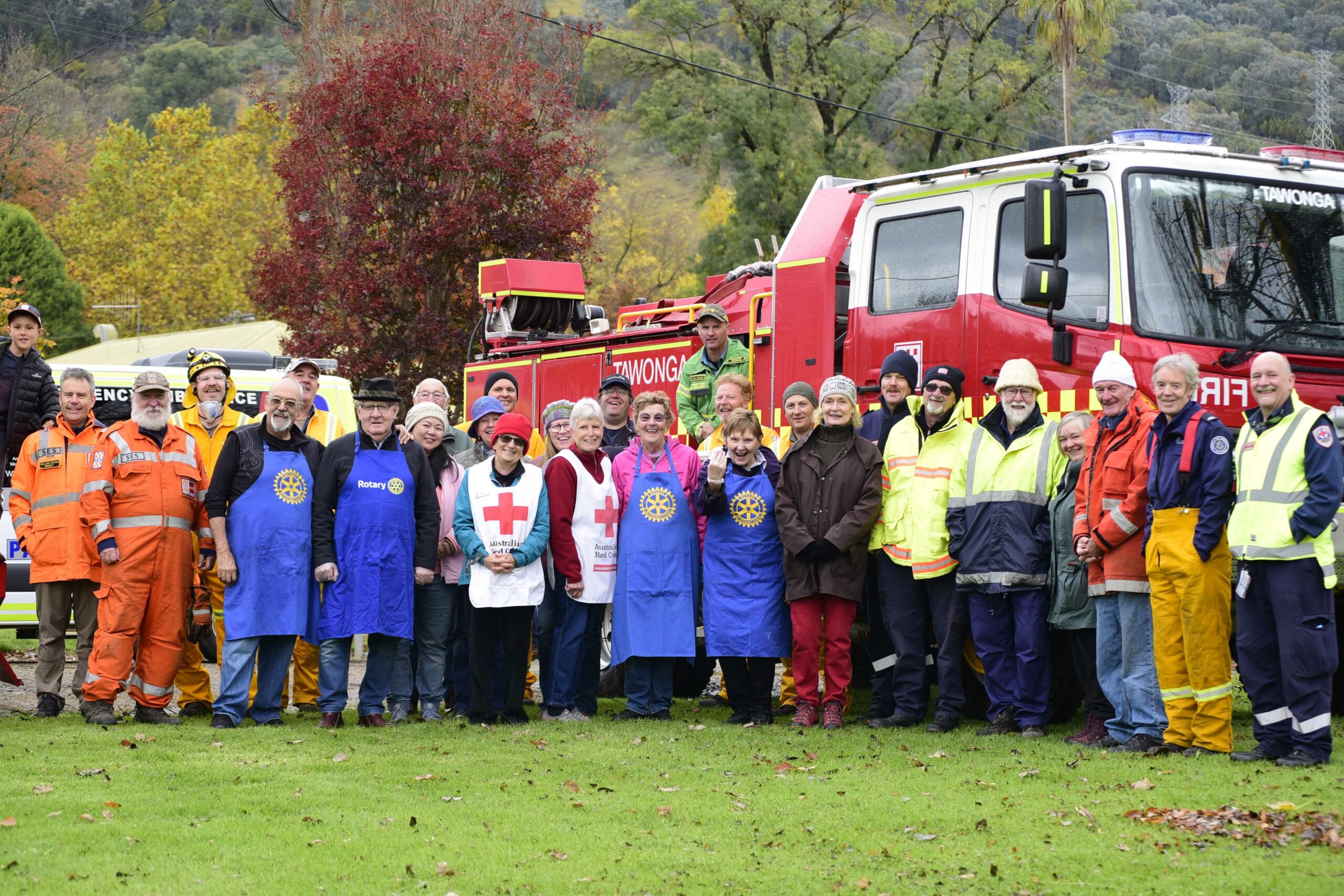
The Bushfire Recovery Fund was established in 2021, in partnership with the Helen Macpherson Smith Trust and the Sidney Myer Fund, seeking to reduce the stress and burnout of NFPs playing a central role in the recovery of fire-impacted communities in North East Victoria (Alpine and Towong) and East Gippsland (including Far East Gippsland).
The Bushfire Recovery Fund grants awarded in this final round are:
- Yoowinna Wurnalung Indigenous Healing Service Ltd – Lakes Entrance/Bairnsdale/Far East Gippsland –Healing our Heart, Healing Our Mind – Building the capacity of Yoowinna Wurnalung to continue delivering services, programming and partnering that has demonstrated value for the recovery of Indigenous people in East Gippsland impacted by the 2019-20 bushfires. $100,000/2 years
- Cann Valley Bush Nursing Centre Incorporated – Cann River and surrounding communities – Governance, Capacity Building and Sustainability Program – Enhancing the delivery of the bush nursing services in the community through training and strategic development consultancy for the Bush Nursing Manager and Committee of Management. $92,076/2 years
- Sarsfield Community Association – Sarsfield – Sarsfield Volunteer Support Worker – Burn Out Circuit Breaker - Providing staff to enable the execution of both large and small recovery projects that contribute to the development of essential infrastructure, foster community engagement, and deliver positive environmental outcomes. $105,122/2 years
In 2021, Corryong Neighbourhood House (CNH) was awarded a two-year grant of $103,340 to improve organisational efficiency and capacity. To continue to meet the needs of their community, grow youth programs and build on social enterprise development, CNH has been awarded an additional $16,232.
In total, the Bushfire Recovery Fund has supported nine NFPs, with a total of $950,000 awarded via multi-year grants. The funds will go towards projects that address organisational needs, identified by each group, so that they can provide the services or programs that support their communities’ recovery from the Black Summer bushfires.
Nina O’Brien, Disaster Resilience and Recovery Lead, FRRR, said that despite the challenges of COVID restrictions, compounded by impacts of additional natural disasters, local groups have shown true determination to sustain operations in order to support community recovery.
“With the first round of grants awarded in 2021, we have already begun to see how these NFPs are building their resilience and capacity so that they can do what they do best, and help their community to heal, for the long-term.
“Having worked with each organisation over multiple years, FRRR is inspired by their ability to leverage the strengths of local knowledge, experience and care for the community and Country, which are critical for the future of these human and environmental landscapes,” Ms O’Brien said.
Like FRRR, Helen Macpherson Smith Trust and the Sidney Myer Fund are dedicated to ensuring that the impact of these grants is lasting and transformative, aiding the sustainability of the organisations to better support long-term recovery and resilience of the communities in North East Victoria and East Gippsland.
Leonard Vary, CEO, Sidney Myer Fund, said awarding core support grants over longer periods to organisations was vital to strengthening the process of community-led recovery.
“The Bushfire Recovery Fund recognises the criticality of communities having a sense of control over and a direct say in their recovery and rebuilding. The Fund offered grantees both certainty of funding and time to identify their needs, plan strategically and implement effectively.”
Debra Morgan, CEO of Helen Macpherson Smith Trust, said the resilience and tenacity of the supported communities is evident in the projects we are seeing delivered with support of the Bushfire Recovery Fund.
“The grant funding, together with the embedded support and guidance from FRRR, is resulting in positive outcomes for the bushfire affected communities, and we hope will set them on a path to a strong future.”
As at 13 October 2023, FRRR has awarded $14.6 million in grants to support 757 response, recovery and preparedness projects in remote, rural and regional communities affected by the 2019-20 bushfires.
The full list of grant recipients and their projects are below.
| Organisation | Project | Location | Grant | |||
|---|---|---|---|---|---|---|
| Round 1, 2021 | ||||||
| Mallacoota Community Health Infrastructure and Resilience Fund Incorporated | Mallacoota Bushfire, Health, Recovery and Resilience Project Boost the organisation's capability to support the community through bushfire recovery by funding additional skilled resourcing for the Mallacoota region. | Mallacoota | $113,230 (2021-2023) | |||
| Corryong Neighbourhood Centre Inc | Building for the Future Boost the organisation's capacity to support the community through recovery from natural disaster by providing additional staffing resources at the Corryong Neighbourhood Centre. | Corryong | $103,340 (2021-2024) | |||
| Alpine Valleys Community Leadership Program | Building Recovery Capacity Through Community Leadership Development in NE VIC Boost skills and knowledge of local community leaders in activities to support recovery from natural disasters. | Corryong | $90,000 (2021-2024) | |||
| Mount Beauty Neighbourhood Centre Inc | Building a Prepared and Resilient Community Bolster the organisations ability to support the community through Bushfire recovery by providing additional staff to assist in the development of community centric recovery activities and events. | Mount Beauty | $100,000 (2021-2024) | |||
| Round 2, 2022 | ||||||
| Jaithmathang Traditional Ancestral Bloodline Original Owners First Nation Aboriginal Corporation | Beginning the Journey to Cultural Healing on Jaithmathang Country Building capacity of Jaithmathang Traditional Aboriginal Bloodline Owners Organisation (TABOO) to practice cultural healing, fire preparedness and care of country in Falls Creek. | Falls Creek | $120,000 (2022-2025) | |||
| Round 3, 2022 | ||||||
| Swifts Creek Bush Nursing Centre Inc | Sustainable Remote Community Health Services Build the capacity of Swifts Creek Bush Nursing Centre to implement a roadmap to secure future sustainability of health care delivery and support of local community needs. | Swifts Creek | $110,000 (2022-2024) | |||
| Round 4, 2023 | ||||||
| Yoowinna Wurnalung Aboriginal Healing Service Limited | Healing Our Heart, Healing Our Mind Build the capacity of Yoowinna Wurnalung to continue delivering services, programming and partnering that has demonstrated value for the recovery of indigenous people in East Gippsland impacted by the 2019/20 bushfires. | Bairnsdale | $100,000 (2023-2025) | |||
| Round 5, 2023 | ||||||
| Cann Valley Bush Nursing Centre Incorporated | Governance, Capacity Building and Sustainability Program Build the capacity of the Bush Nursing practice’s staff and committee of management with governance training and the consultant support to develop a sustainable strategic plan to benefit the Cann River community. | Cann River | $92,076 (2023-2025) | |||
| Sarsfield Community Association Inc | Sarsfield Volunteer Support Worker – Burn Out Circuit Breaker Build community capacity by employing a project officer to support the volunteer-run Sarsfield Community Association in community development and recovery activities. | Sarsfield | $105,122 (2023-2025) | |||
| Corryong Neighbourhood Centre Inc | Building for the Future - Year 3 A supplementary grant to continue funding staff resources at the Corryong Neighbourhood Centre to boost organisational capacity for supporting long term community recovery. | Corryong | $16,232 (2023-2024) | |||
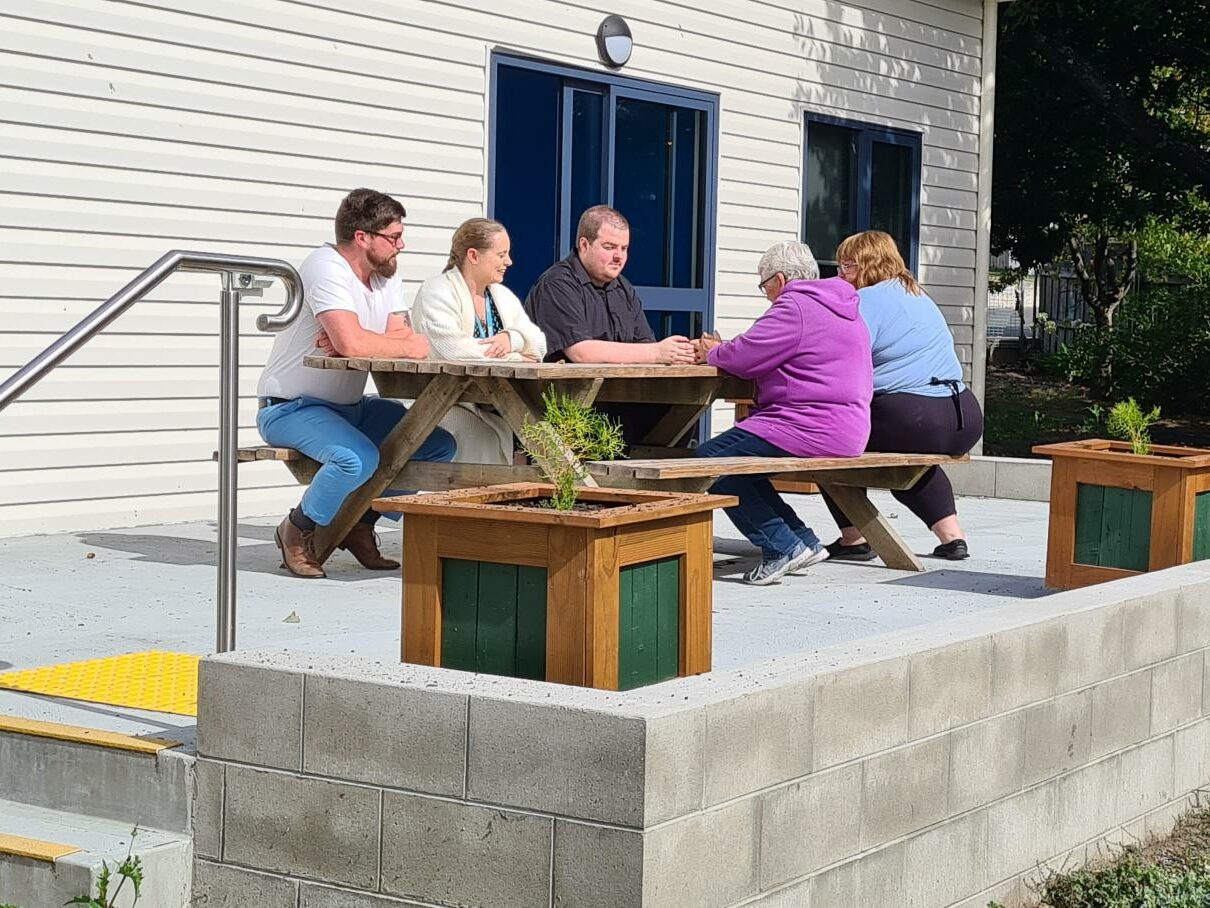
New Norfolk, a pretty town on the banks of the Derwent River and Tasmania’s third oldest settlement, is home to a significant number of community members vulnerable due to age, socio-economic impacts and existing physical and mental health issues. The Derwent Community House provides a welcoming space for the New Norfolk community, servicing a catchment of over 5,000 people in an otherwise under-served region of Tasmania. The House offers access to training, educational & employment pathways, and programs to connect and support vulnerable community members.
The DVCH moved into the old kindergarten site in 2017, receiving state government funding to renovate the facility, although a lack of space has restricted the delivery of activities and services. The Community House identified a shower facility and outdoor activity spaces as the highest priorities to further improve the facility’s functionality.
A $10,000 Strengthening Rural Communities (SRC) grant supported by the Sidney Myer Fund, matched funds raised by the Community House to enable the new outdoor deck and shower room to be created. The building has been transformed into a thriving community hub and the enhanced facilities have been eagerly embraced by local community members. The outdoor deck is a popular space for meetings, activities and gatherings, fostering opportunities for greater community connection. The accessible shower facility supports community members who may lack access to shower facilities or hot water.
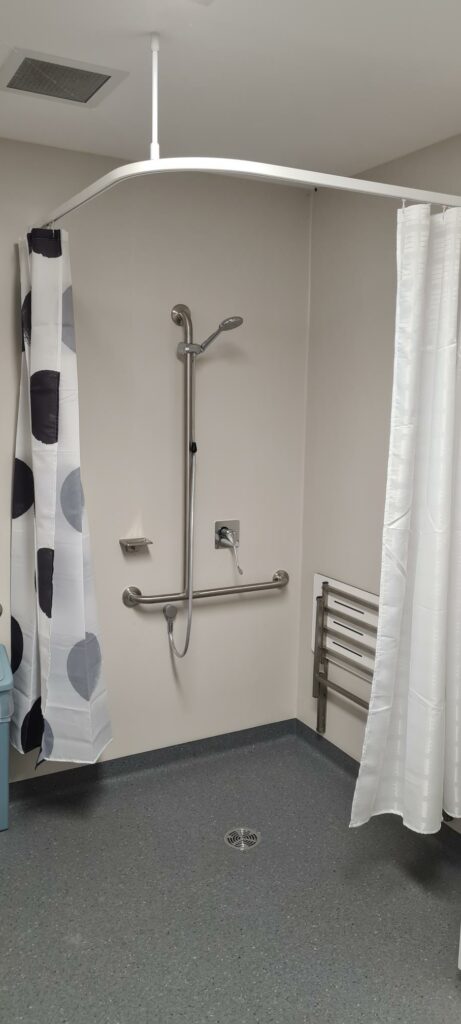
The House co-coordinator, Dianne Booth emphasised the importance of the accessible shower facilities. “Some Community members do not have access to shower facilities for a number of reasons, often as a result of homelessness and/or the inability to meet the cost of services such as electricity. Not having access to a shower has far reaching impacts, not only on a person’s health, but on their mental wellbeing. It also has a major impact upon a person’s ability and/or willingness to participate in activities, even within their own social and family circles, let alone within the wider community.“
These improvements have boosted the Community House’s ability to address the diverse needs of the community and improve health and wellbeing.
Dianne said the project “has gone a long way towards achieving our goal of providing our community with opportunities to feel connected, included and respected. Some people express that they simply feel more comfortable in an outdoor setting, but due to factors such as weather, personal health & mobility issues, this is not always practical without modified spaces to gather.
“Having a modified outdoor space also provides us with an opportunity to address our forward planning to include an outdoor kitchen facility to provide even more scope for community engagement.”
In many rural communities, non-denominational school chaplains promote strong community connection, participation opportunities and engagement to reduce isolation and encourage better physical and mental health. While these positions are generally funded through local donations, in recent years there simply hasn’t been the money to fund them locally due to drought and, more recently, reduced tourism from COVID-19 restrictions.
Through FRRR’s Tackling Tough Times Together grant program, Scripture Union Queensland received $131,490 to support chaplaincy positions at Ravenswood State School, Charter Towers Central State School and Mareeba State School until June 2022. The grant was made possible through generous donations from the Sidney Myer Fund and the Tim Fairfax Family Foundation.
This funding ensures all programs and activities coordinated by the chaplains, including one-on-one pastoral care conversations and classroom support, are free for all children, young people, families and school staff. These activities help to reduce isolation and increase wellbeing and community participation in communities suffering from the long-term effects of drought.
Since funds were awarded in 2019, the schools have been able to implement change and growth within their chaplaincy programs. At Ravenswood State School, chaplain Anne – a much loved member of the community – was finally able to retire at 83 years old. Her position has been filled by a long term local Charters Towers resident, who works two days a week.
The chaplain at Charter Towers has been able to increase her support to two days a week and is seeing a positive response to the ‘Girls with a Purpose Resilience’ program. Twelve students completed the program in 2019 and there was general consensus among the participants that it was a special time engaging with facilitators and peers. After the COVID-19 school closure in 2020, all girls in grade 6 are now taking part in the program.
A particular highlight for the Mareeba State School has been the implementation of the Bike-Bus program to encourage regular physical activity and increase school attendance and social and community engagement. Since being established in mid-2019, the program has engaged 30 students, as well as parents, grandparents, siblings, teachers and police. It also led to the creation of the Bike Repair Club – an alternative for those who enjoy hands on learning, with all students becoming much more engaged in their education.
The principal of the Mareeba State School, Mandy Whybird, noted the program’s positive impact.
“Our school chaplain provides an invaluable source of support for the students at Mareeba State School. Aside from running friendship groups, supporting children in classes and running lunchtime activities for children who may find the playground challenging, our chaplain also assists in providing breakfasts for children in need and working with children who may have experienced loss or trauma.
“The chaplain also assists to support staff well-being. When our school was shaken by the loss of a teacher last year, our Chaplain was integral to the recovery process for staff,” Ms Whybird said.
Capacity building grants support long-term recovery initiatives of local not-for-profits and community organisations
FRRR has awarded grants to four Victorian community groups playing a central role in the long-term recovery of communities impacted by the 2019/20 bushfires.
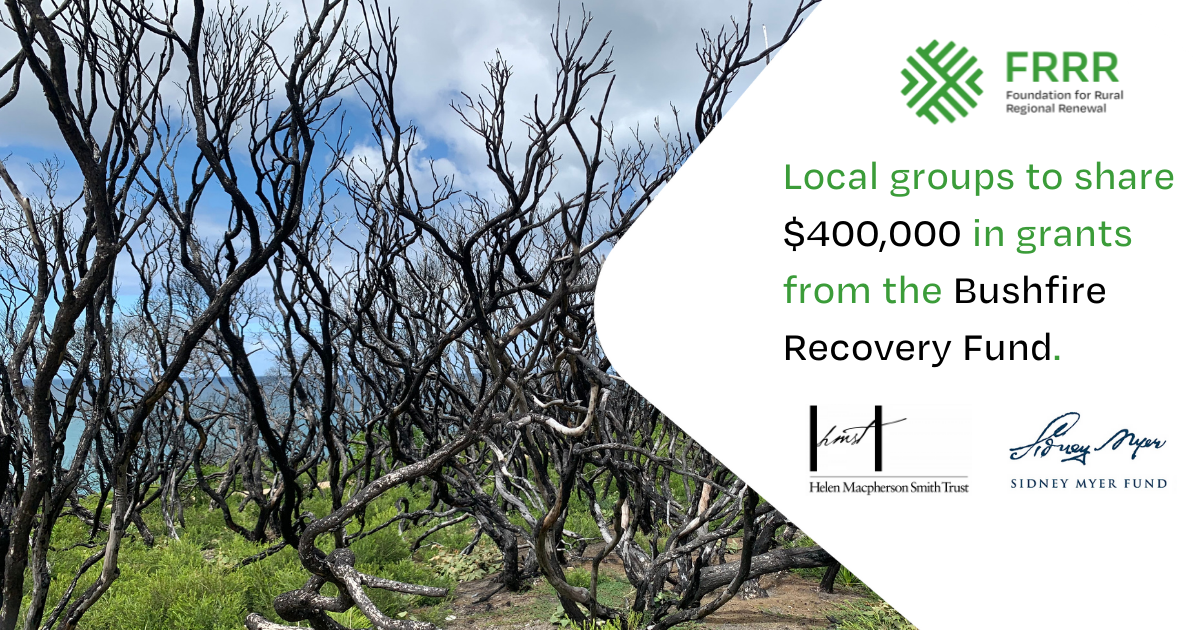
The grants are the first to be awarded through the Bushfire Recovery Fund established thanks to a multi-year partnership with the Helen Macpherson Smith Trust (HMSTrust) and the Sidney Myer Fund. The program is designed to strengthen the capacity of local not-for-profit organisations and community groups operating in fire-affected areas to support the ongoing recovery of communities.
Natalie Egleton, CEO of FRRR, said that having access to longer-term, multi-year support is vital when it comes to creating effective solutions on the ground to allow these communities to recover and thrive.
“These grants recognise the vital role of these organisations and invest in the skills, tools and resources they need to support their community as they rebuild, and to sustain their work beyond the recovery. With the additional pressure of COVID-19, this multi-year support will mean they can confidently plan, invest and be there to support their community as needs change,” Ms Egleton said.
HMSTrust CEO, Debra Morgan, said that the Trust believes local organisations are best placed to understand local needs, and that this is particularly the case in bushfire-affected areas, where it’s critical that organisations have the support they need to sustain their operations.
“The four organisations have identified the needs specific to their communities, and each has a unique approach to the road to recovery. The projects reflect the local context of each community and the interventions required for long-term recovery. We are pleased to support these strong organisations seeking to build organisational capacity and resilience, and we hope they will serve to strengthen the communities into the future,” Ms Morgan said.
Sidney Myer Fund CEO, Leonard Vary, said that the Bushfire Recovery Fund aims to strengthen the operations of ‘backbone’ organisations and give each the means to implement effective and innovative approaches in supporting impacted communities over the longer term.
“Local organisations must be given the tools to develop and implement plans for sustainability and growth so as to support bushfire-affected communities into the future. These grants will help enhance organisational capability and improve the services offered to communities including future preparedness efforts,” said Mr Vary.
The four groups funded are:
- Alpine Valley Community Leadership (AVCL) – $90,000 – Build AVCL’s capacity to strategically plan and deliver leadership training that can more effectively support and build community recovery capacity in north-east Victoria.
- Corryong Neighbourhood House Inc – $103,340 – Increase operational capacity by providing an additional .8 FTE to the core staffing levels. The increased resource will enable Corryong Neighbourhood House Inc to continue to progress its strategic social enterprise and community development work including participation in bushfire recovery work.
- Mallacoota Community Health Infrastructure and Resilience Fund Inc (CHIRF) – $113,230 – Enable the employment of a skilled local project manager, who will progress the current aims for developing the local mental health services offering through strategic planning, fundraising and project design and development.
- Mount Beauty Neighbourhood Centre (MBNC) – $100,000 – Increase operational capacity of the organisation, which will allow it to develop a prepared and resilient community. The driving force behind this application is the volunteer-run Keep Calm Committee, which works alongside MBNC.
More information about the Bushfire Recovery Fund is on this website.
Supporting capacity of organisations in Victoria’s bushfire-impacted communities
FRRR has announced a multi-year partnership with the Helen Macpherson Smith Trust (HMSTrust) and the Sidney Myer Fund to build the capacity of local organisations playing a central, coordinating or networking role in the recovery of Victorian communities affected by the 2019/20 bushfires.
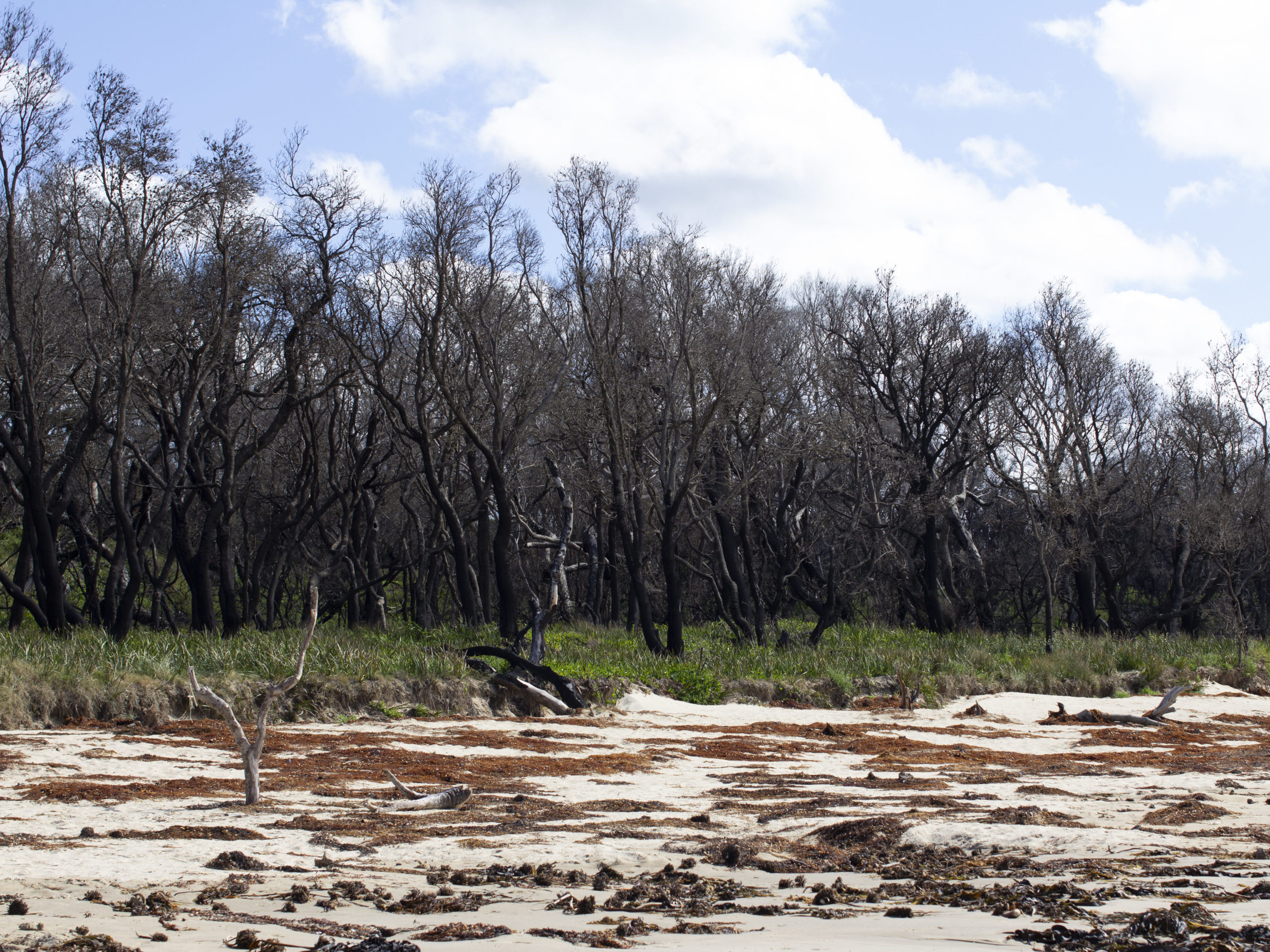
The Bushfire Recovery Fund will award grants of up to $90,000 to community groups and local not-for-profit organisations working in Victorian fire-affected regions. The program will fund initiatives that enhance, improve or sustain operations of these keystone organisations for up to three years, and therefore strengthen community-led recovery over the medium and long-term.
Natalie Egleton, CEO of FRRR, said that the partnership is a result of a shared vision for aligning funding and support to community-led solutions that build resilience and continued viability and vitality.
“FRRR and our generous donor partners HMSTrust and the Sidney Myer Fund have come together to help local groups to be more viable, resilient, and sustainable. The program is designed to help address organisational needs, and strengthen capacity to adapt and respond to the changing or emerging needs of communities.
“FRRR’s role will be to act as a facilitator, to encourage and support these community groups so that they can continue to do the work that is so important to the ongoing recovery of their communities,” Ms Egleton said.
HMSTrust Executive Officer Lin Bender said that the Trust believes the key program goal of building organisational capacity is critical to ensuring local groups can operate in what are challenging economic, emotional, and ecological conditions.
“By supporting applicants that are deeply engaged with their communities to sustain or adapt their model or way of working, we aim to ensure more viable, resilient and sustainable organisations that can support ongoing recovery efforts,” Lin said.
Sidney Myer Fund CEO Leonard Vary said the broader intent of the program is to inform disaster recovery best practice by understanding and addressing the needs of critical community ‘backbone’ organisations.
“The capacity to manage normal day-to-day operations along with the demands of recovery has been identified as a challenge for many organisations in bushfire-affected communities,” Mr Vary said. “By engaging directly with these organisations, we can facilitate and fund not only the development of locally relevant, multi-year projects that build capacity and resilience but potentially identify new approaches to long-term community recovery.”
To reduce the burden on potential applicants, a shortlist of organisations from declared fire affected areas in Victoria, identified through broad stakeholder consultation, will be invited to apply for funding. The first successful grantees are expected to be announced in October 2021. Organisations who consider this opportunity to be aligned to their situation should contact FRRR to discuss their needs.
More information about the program can be found here.
It’s hard not to smile when entering George Town Neighbourhood House. The community centre is a vibrant place, buzzing with people working to fight structural disadvantages in the area. With a couple of full-time staff and around a dozen loyal volunteers, this Neighbourhood House exists to create a safer and more inclusive and resilient community by supporting disadvantaged people and families.
But maintaining their high level of engagement and attracting new visitors was a challenge for their small team. They needed an extra pair of hands, someone who could help them reach the right people and promote the programs throughout the community. They submitted a brilliant application to the Strengthening Rural Communities program and, thanks to the Sidney Myer Fund, received $10,000 in grants to help cover the wages for their new communications officer.
But then came the next challenge – COVID-19. Suddenly, many of the community-engagement activities they had planned for the new staff member were impossible, or even illegal, to execute. This could have thrown a real spanner in the works for George Town Neighbourhood House… but nay! Instead of crumbling under the new restrictions, they found ways to adapt – and even thrive – in spite of them.
“We had to change how we interacted with the community from the end of March this year … We had to cease all face-to-face contact,” a staff member said. And it worked! They connected with residents online, engaged in collaborations with other organisations and even scored some airtime on the local radio station.
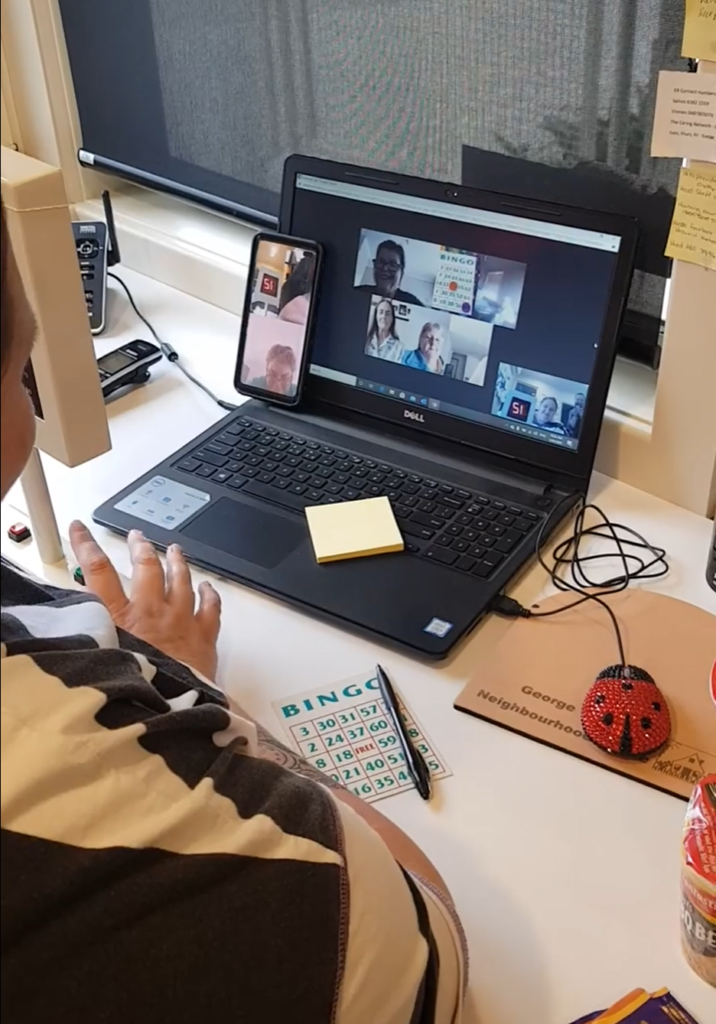
The highlight, the team agreed, was their Online Family Baking project. With Port Dalrymple School donating a big batch of ingredients, the Neighbourhood House could provide a baking-kit for 20 families in the community, complete with video instructions on how to bake delicious chocolate crackles. “We had a very good response and,” they told us. Following the success of this first bake-off, the Neighbourhood House were able to offer a second round of baking for the families who missed out – this time for Anzac biscuits.
In the end, this little community centre managed to positively benefit some 1,500 people with their grant, including the 40 families who participated in the baking project.
“We are very proud with how we were able to adapt, and still engage and extend to our community, in-spite of all the current COVID-19 issues,” a support worker said.

